Summer Reads 2013
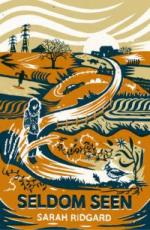 Natasha Soobramanien Seldom Seen, by Sarah Ridgard Hutchinson, London, 2012, hbk, 256pp, £14.99, 9780091944124, www.randomhouse.co.uk Set in Suffolk in the 1980s, this wonderful novel is about how our secrets shape us. Shy teenager Desiree White becomes a village celebrity when she finds a dead baby in a ditch. Knowing far too many of her neighbours’ secrets (no one ever notices her), Desiree struggles to contain them in the face of feverish speculation surrounding this event. A few years later, Desiree is a grown woman still living at home, haunted by the memory of her tragic discovery. The story of how she finally lays the little soul to rest is poignant, earthy and very, very funny.
Natasha Soobramanien Seldom Seen, by Sarah Ridgard Hutchinson, London, 2012, hbk, 256pp, £14.99, 9780091944124, www.randomhouse.co.uk Set in Suffolk in the 1980s, this wonderful novel is about how our secrets shape us. Shy teenager Desiree White becomes a village celebrity when she finds a dead baby in a ditch. Knowing far too many of her neighbours’ secrets (no one ever notices her), Desiree struggles to contain them in the face of feverish speculation surrounding this event. A few years later, Desiree is a grown woman still living at home, haunted by the memory of her tragic discovery. The story of how she finally lays the little soul to rest is poignant, earthy and very, very funny.  Selma Dabbagh Americanah, by Chimamanda Ngozi Adichie Fourth Estate, London, 2013, hbk, 400pp, £20, 9780007306220, www.4thestate.co.uk This is a novel, which, among many other masterful feats, causes the word ‘ceiling’ to enter the lexicon of sexual terms. ‘I’m longing for ceiling,’ Ifemelu writes on Obinze’s geography notebook. Having fallen in love at school the couple are separated by continents and a marriage, returning to Nigeria where their education and scholarly heritage are forced to adapt in a world where those who have, thrive on vanity and ostentation and those who have not, barely survive. Adichie’s work is always compellingly readable, her characters as memorable as friends, the completed form a thing of beauty. But it is Adichie’s unblinking vision of her own people, viewed with love but without illusion, her supreme ability to capture the tenderness and greed of the human heart while maintaining the broadest of intellectual understandings of the world across three continents that make her one of the most important living writers today.
Selma Dabbagh Americanah, by Chimamanda Ngozi Adichie Fourth Estate, London, 2013, hbk, 400pp, £20, 9780007306220, www.4thestate.co.uk This is a novel, which, among many other masterful feats, causes the word ‘ceiling’ to enter the lexicon of sexual terms. ‘I’m longing for ceiling,’ Ifemelu writes on Obinze’s geography notebook. Having fallen in love at school the couple are separated by continents and a marriage, returning to Nigeria where their education and scholarly heritage are forced to adapt in a world where those who have, thrive on vanity and ostentation and those who have not, barely survive. Adichie’s work is always compellingly readable, her characters as memorable as friends, the completed form a thing of beauty. But it is Adichie’s unblinking vision of her own people, viewed with love but without illusion, her supreme ability to capture the tenderness and greed of the human heart while maintaining the broadest of intellectual understandings of the world across three continents that make her one of the most important living writers today. 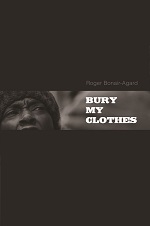 Joshua Bennett Bury My Clothes, by Roger Bonair-Agard Haymarket Books, Chicago, 2013, pbk, 120pp, £11.99, 9781608462698, www.haymarketbooks.org Roger Bonair-Agard's Bury My Clothes moves with gorgeous, alchemical fury, unmooring everything it touches. The collection ponders the question of what it means for us to thrive together in a community across ontological borders — to not only live in, but live toward the world, as if it does not exist solely for human exploits. In one of the book’s most vibrant scenes, calypso artist Roaring Lion tells young Roger that ‘three is the luckiest of all numbers.’ In this, Bonair-Agard’s third time out, the Lion’s theory is airtight. Bury My Clothes is winsome testimony, an incantation you can’t let go.
Joshua Bennett Bury My Clothes, by Roger Bonair-Agard Haymarket Books, Chicago, 2013, pbk, 120pp, £11.99, 9781608462698, www.haymarketbooks.org Roger Bonair-Agard's Bury My Clothes moves with gorgeous, alchemical fury, unmooring everything it touches. The collection ponders the question of what it means for us to thrive together in a community across ontological borders — to not only live in, but live toward the world, as if it does not exist solely for human exploits. In one of the book’s most vibrant scenes, calypso artist Roaring Lion tells young Roger that ‘three is the luckiest of all numbers.’ In this, Bonair-Agard’s third time out, the Lion’s theory is airtight. Bury My Clothes is winsome testimony, an incantation you can’t let go.  Nauman Khalid Pakistan on the Brink: The Future of Pakistan, Afghanistan and the West, by Ahmed Rashid Penguin Books, London, 2013, pbk, 256pp, £9.99, 9780241960073, www.penguin.co.uk In a book which provides a lucid overview of the region’s travails but sometimes gets a little breathless in pace and hectoring in tone, Rashid repeatedly identifies the Pakistani military and Islamic extremism as the main culprits which continue to foment trouble in the adjoining countries. He goes beyond viewing Pakistan as part of the US-Afghanistan-Pakistan nexus by effectively demonstrating how Pakistan’s politico-strategic situation impacts the wider world: India and China to the east; Russia and the Central Asian Republics in the north and Iran, Turkey and the Arab world in the west.
Nauman Khalid Pakistan on the Brink: The Future of Pakistan, Afghanistan and the West, by Ahmed Rashid Penguin Books, London, 2013, pbk, 256pp, £9.99, 9780241960073, www.penguin.co.uk In a book which provides a lucid overview of the region’s travails but sometimes gets a little breathless in pace and hectoring in tone, Rashid repeatedly identifies the Pakistani military and Islamic extremism as the main culprits which continue to foment trouble in the adjoining countries. He goes beyond viewing Pakistan as part of the US-Afghanistan-Pakistan nexus by effectively demonstrating how Pakistan’s politico-strategic situation impacts the wider world: India and China to the east; Russia and the Central Asian Republics in the north and Iran, Turkey and the Arab world in the west. 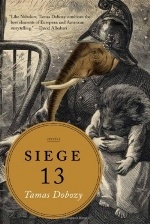 Vincent Czyz Siege 13: Stories, by Tamas Dobozy Milkweed Editions, Minneapolis, 2013, pbk, 300pp, $16, 9781571310972, milkweed.org Siege 13 by Tamas Dobozy is the best collection I’ve read in a while. It’s not just that things happen in his stories; it’s not just that Dobozy constructs actual plots in which characters face nightmarish dilemmas; it’s that Dobozy weaves his characters, their irrevocable choices, their elaborate defense mechanisms and the forces of history or circumstance into believable tales that aren’t likely to be forgotten a week later. Alternating between past and present, the stories are set primarily in Toronto and in a Budapest either brutalized by the Red Army or chilled by the Cold War. Highly recommended.
Vincent Czyz Siege 13: Stories, by Tamas Dobozy Milkweed Editions, Minneapolis, 2013, pbk, 300pp, $16, 9781571310972, milkweed.org Siege 13 by Tamas Dobozy is the best collection I’ve read in a while. It’s not just that things happen in his stories; it’s not just that Dobozy constructs actual plots in which characters face nightmarish dilemmas; it’s that Dobozy weaves his characters, their irrevocable choices, their elaborate defense mechanisms and the forces of history or circumstance into believable tales that aren’t likely to be forgotten a week later. Alternating between past and present, the stories are set primarily in Toronto and in a Budapest either brutalized by the Red Army or chilled by the Cold War. Highly recommended. 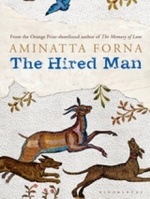 Arifa Akbar The Hired Man, by Aminatta Forna Bloomsbury, London, 2013, hbk, 304pp, £16.99, 9781408817667, www.bloomsbury.com The story unravels in contemporary Croatia, over a single summer. It is told through the eyes of Duro Kolak, a handyman with a scarred personal history that leaks out over the course of this unsettling and supremely masterful novel. Duro is ‘the hired man’ for a British family that has bought a summer home in Gost, a sleepy village whose identity is torn between its recent history as a territory spilling with terrors during the conflict after the break-up of former Yugoslavia and its post-war re-invention as a tourist oasis. What stands out is Forna’s near-perfect authorial control. Her prose quietly grips us by the throat and then tightens its hold. It is storytelling at its most taut.
Arifa Akbar The Hired Man, by Aminatta Forna Bloomsbury, London, 2013, hbk, 304pp, £16.99, 9781408817667, www.bloomsbury.com The story unravels in contemporary Croatia, over a single summer. It is told through the eyes of Duro Kolak, a handyman with a scarred personal history that leaks out over the course of this unsettling and supremely masterful novel. Duro is ‘the hired man’ for a British family that has bought a summer home in Gost, a sleepy village whose identity is torn between its recent history as a territory spilling with terrors during the conflict after the break-up of former Yugoslavia and its post-war re-invention as a tourist oasis. What stands out is Forna’s near-perfect authorial control. Her prose quietly grips us by the throat and then tightens its hold. It is storytelling at its most taut. 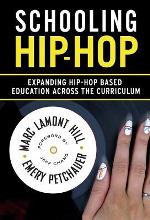 Blake Brandes Schooling Hip-Hop: Expanding Hip-Hop Based Education Across the Curriculum, edited by Marc Lamont Hill and Emery Petchauer, foreword by Jeff Chang Teachers’ College Press, Columbia University, New York, 2013, pbk, 208pp, $29.95, 9780807754313, www.tcpress.org As hip-hop approaches its 35th birthday, Marc Lamont Hill and Emery Petchauer are giving Hip-Hop Based Education a next-level gift with Schooling Hip-Hop, which moves beyond literary analyses of rap songs into pedagogical explorations of hip-hop aesthetics, sensibilities and worldviews in the classroom. With a multidisciplinary emphasis on using hip-hop cultural forms (like the cypher, freestyling, battling, sampling and remixing) in addition to hip-hop content, the book’s eight academic essays by various hip-hop scholars provide an intriguing theoretical context for the next generation of hip-hop educators to engage students and transform teaching and learning across the curriculum.
Blake Brandes Schooling Hip-Hop: Expanding Hip-Hop Based Education Across the Curriculum, edited by Marc Lamont Hill and Emery Petchauer, foreword by Jeff Chang Teachers’ College Press, Columbia University, New York, 2013, pbk, 208pp, $29.95, 9780807754313, www.tcpress.org As hip-hop approaches its 35th birthday, Marc Lamont Hill and Emery Petchauer are giving Hip-Hop Based Education a next-level gift with Schooling Hip-Hop, which moves beyond literary analyses of rap songs into pedagogical explorations of hip-hop aesthetics, sensibilities and worldviews in the classroom. With a multidisciplinary emphasis on using hip-hop cultural forms (like the cypher, freestyling, battling, sampling and remixing) in addition to hip-hop content, the book’s eight academic essays by various hip-hop scholars provide an intriguing theoretical context for the next generation of hip-hop educators to engage students and transform teaching and learning across the curriculum. 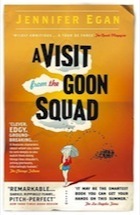 Rajeev Balasubramanyam A Visit from the Goon Squad, by Jennifer Egan Corsair, London, 2011, pbk, 368pp, £7.99, 9781780330969, www.constablerobinson.com It is difficult to say if A Visit from the Goon Squad is a novel or a book of short stories. All the characters have some involvement in the music industry, used as a metaphor for the spiritual condition of a species threatened by narcissism, technology, lust and the brutality of market forces. Were it not for the humanity and feeling that pervade this book, it would certainly feel gimmicky (one section is written in the form of a PowerPoint presentation), but instead Egan proves that postmodern ingenuity and old-fashioned heart need not be mutually exclusive.
Rajeev Balasubramanyam A Visit from the Goon Squad, by Jennifer Egan Corsair, London, 2011, pbk, 368pp, £7.99, 9781780330969, www.constablerobinson.com It is difficult to say if A Visit from the Goon Squad is a novel or a book of short stories. All the characters have some involvement in the music industry, used as a metaphor for the spiritual condition of a species threatened by narcissism, technology, lust and the brutality of market forces. Were it not for the humanity and feeling that pervade this book, it would certainly feel gimmicky (one section is written in the form of a PowerPoint presentation), but instead Egan proves that postmodern ingenuity and old-fashioned heart need not be mutually exclusive.  Amanda Smyth Skippy Dies, by Paul Murray Penguin Books, London, 2011, pbk, 672pp, £8.99, 9780141009957, www.penguin.co.uk I have wanted to read this big sprawling novel (661 pages) for a long time. This particular edition comes in three slim books in its own beautiful bookcase, so it’s easy to carry about. I rarely laugh out loud at anything, but I’ve found myself chortling and chuckling uncontrollably on the train. Paul Murray is not just funny; he gets to the very heart of what it feels like to be an adolescent — the weirdness, angst, the enormous pain of growing up, the inner longings and inevitable disappointments. A hilarious, tender, deeply moving book and the prose is seamless. A wonderful tragic ride.
Amanda Smyth Skippy Dies, by Paul Murray Penguin Books, London, 2011, pbk, 672pp, £8.99, 9780141009957, www.penguin.co.uk I have wanted to read this big sprawling novel (661 pages) for a long time. This particular edition comes in three slim books in its own beautiful bookcase, so it’s easy to carry about. I rarely laugh out loud at anything, but I’ve found myself chortling and chuckling uncontrollably on the train. Paul Murray is not just funny; he gets to the very heart of what it feels like to be an adolescent — the weirdness, angst, the enormous pain of growing up, the inner longings and inevitable disappointments. A hilarious, tender, deeply moving book and the prose is seamless. A wonderful tragic ride. 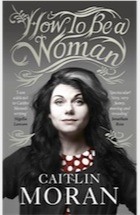 Kishwar Desai How To Be a Woman, by Caitlin Moran Ebury Press, London, 2012, pbk, 320pp, £7.99, 9780091940744, www.eburypublishing.co.uk Unexpectedly enjoyable, the book discusses ‘feminism’ for the ordinary woman. Moran has a sense of humour and an ability to be disarmingly open about her own life. She raises all the important issues of dealing with femaleness while seeking equality, in a very straightforward fashion. This is not an intimidating book and yet it is thought-provoking. Drawing upon her own experiences while growing up, as a working woman as well as a wife and a mother, Moran questions whether we are in a post-feminism world and suggests that we need to do more.
Kishwar Desai How To Be a Woman, by Caitlin Moran Ebury Press, London, 2012, pbk, 320pp, £7.99, 9780091940744, www.eburypublishing.co.uk Unexpectedly enjoyable, the book discusses ‘feminism’ for the ordinary woman. Moran has a sense of humour and an ability to be disarmingly open about her own life. She raises all the important issues of dealing with femaleness while seeking equality, in a very straightforward fashion. This is not an intimidating book and yet it is thought-provoking. Drawing upon her own experiences while growing up, as a working woman as well as a wife and a mother, Moran questions whether we are in a post-feminism world and suggests that we need to do more. 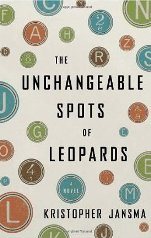 Jessica Stilling The Unchangeable Spots of Leopards, by Kristopher Jansma Viking Books, New York, 2013, pbk, 254pp, $12.99, 9780670026005, www.us.penguingroup.com I have never been a fan of writers who write about writing, not unless they’ve proven themselves worthy by flexing their literary chops on something not so self-indulgent. Doris Lessing, Philip Roth, writers with a repertoire about as large as some people’s libraries, have earned the right to write about the elusiveness of the story. While Kristopher Jansma’s debut novel does touch mostly on the idea of what it means to be a writer, it really does do more than that, cutting to the core of what it means to want something so badly you’ll lie, cheat, steal and reinvent reality for it. It’s a story about reality and what it means not only to mould your life, but to find a place in the world. A somewhat confusing, but definitely enjoyable read, Jansma’s new voice will hopefully be around to fill many more spaces in many more libraries.
Jessica Stilling The Unchangeable Spots of Leopards, by Kristopher Jansma Viking Books, New York, 2013, pbk, 254pp, $12.99, 9780670026005, www.us.penguingroup.com I have never been a fan of writers who write about writing, not unless they’ve proven themselves worthy by flexing their literary chops on something not so self-indulgent. Doris Lessing, Philip Roth, writers with a repertoire about as large as some people’s libraries, have earned the right to write about the elusiveness of the story. While Kristopher Jansma’s debut novel does touch mostly on the idea of what it means to be a writer, it really does do more than that, cutting to the core of what it means to want something so badly you’ll lie, cheat, steal and reinvent reality for it. It’s a story about reality and what it means not only to mould your life, but to find a place in the world. A somewhat confusing, but definitely enjoyable read, Jansma’s new voice will hopefully be around to fill many more spaces in many more libraries. 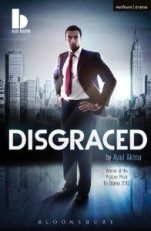 Avaes Mohammad Disgraced, by Ayad Akhtar Methuen Drama, London, 2013, pbk, 112pp, £9.99, 9781472532091, www.bloomsbury.com Sufficient time has passed since the twin tower attacks of 9/11 and the events succeeding it. Enough dust has settled upon rubble and enough stillness can be found to begin collecting thoughts. Akhtar’s seering play delivers a sweeping polemical battle localised in its central character Amir, an ambitious Manhattan lawyer who, despite his desperation to be absolved of his religious identity, remains shackled by it to climactic effect. The rigorous and unremitting weight of ideas is felt to somewhat compromise the wholeness of characters; nevertheless this prize-winning, adeptly architected play will remain important in attempting to make sense of our new world.
Avaes Mohammad Disgraced, by Ayad Akhtar Methuen Drama, London, 2013, pbk, 112pp, £9.99, 9781472532091, www.bloomsbury.com Sufficient time has passed since the twin tower attacks of 9/11 and the events succeeding it. Enough dust has settled upon rubble and enough stillness can be found to begin collecting thoughts. Akhtar’s seering play delivers a sweeping polemical battle localised in its central character Amir, an ambitious Manhattan lawyer who, despite his desperation to be absolved of his religious identity, remains shackled by it to climactic effect. The rigorous and unremitting weight of ideas is felt to somewhat compromise the wholeness of characters; nevertheless this prize-winning, adeptly architected play will remain important in attempting to make sense of our new world.
